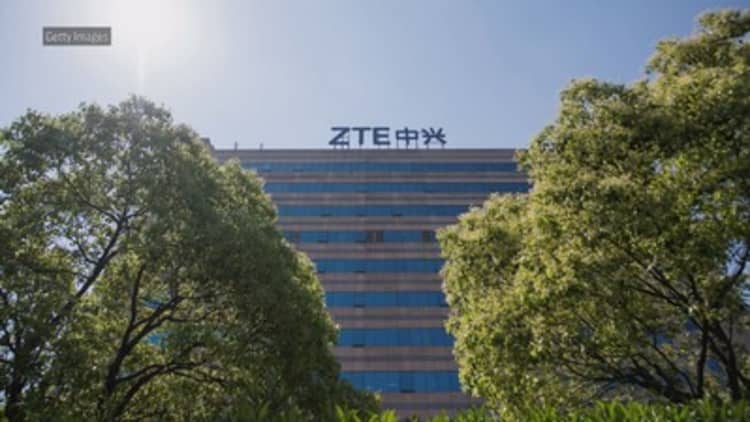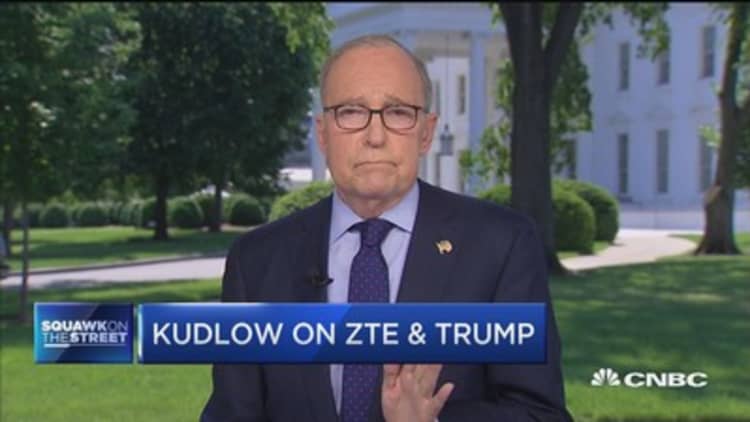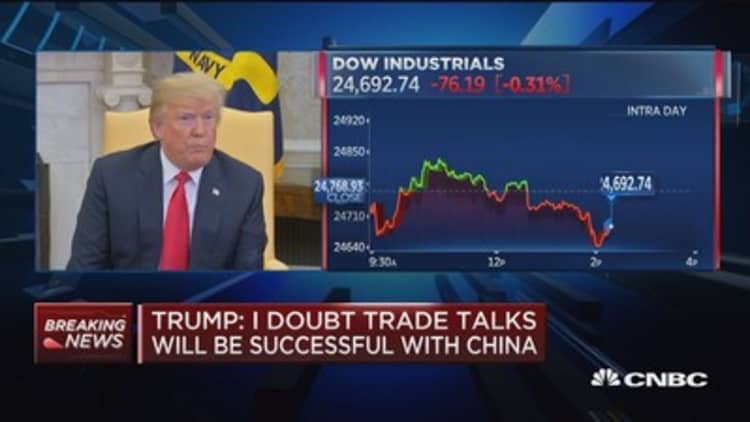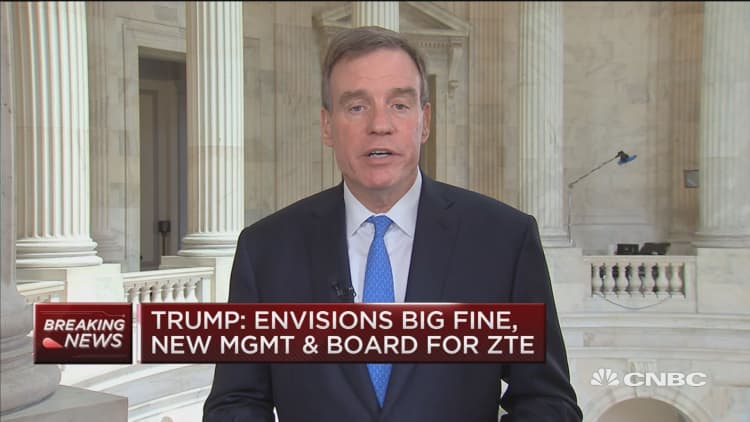ZTE was not a name many Americans would've recognized until very recently.
Most of us, if we knew the Chinese brand at all, viewed it as a maker of low-end smartphones sold by AT&T and Verizon. According to Counterpoint Research, ZTE captured 11 percent of the U.S. smartphone market in the first quarter, behind Apple, Samsung and LG.
Now ZTE is making headlines daily. Last month, the U.S. banned the company from purchasing parts from U.S. manufacturers because it was selling equipment with American parts to Iran and North Korea.

But President Donald Trump has only muddied the situation further. On May 13, Trump tweeted that he's working with China's President Xi Jinping to keep the company in business as "part of a larger trade deal we're negotiating." And on Tuesday, Trump said that no deal is done, contradicting a Wall Street Journal report indicating the Trump administration came to a tentative agreement with Beijing to revive the company.
Here's what's going on and what you need to know.
What is ZTE?
While ZTE is best known by consumers for selling smartphones, the 33-year-old company has long been a big manufacturer of telecommunications equipment, the kind of stuff that allows large carriers to operate their wireless and data networks.
It was China's first state-owned telecom equipment company to go public and is listed on the Shenzhen and Hong Kong stock exchanges.
ZTE, which employs almost 75,000 people around the world, operates in more than 160 countries. In the smartphone market, it competes with Apple and Samsung as well Chinese companies Huawei and Xiaomi.
ZTE's U.S. subsidiary — ZTE USA — is based in a Dallas suburb and initially opened in 2009 as a testing lab.
What made the United States angry?
In its phones, ZTE uses all sorts of U.S. technology, including chips from Qualcomm, glass from Corning and Android software from Google.
That's all fine. But what angered U.S. lawmakers was the company's business dealings with Iran and North Korea in violation of trade agreements.
Last year, ZTE admitted guilt and paid $1.19 billion in fines for those violations. Commerce Secretary Wilbur Ross said at the time that the U.S. was "putting the world on notice" and that there will be no more "improper trade games."

In April, the U.S. Commerce Department said ZTE was officially banned from purchasing U.S. parts because it allegedly "misled" regulators. Rather than disciplining the employees who were responsible for selling products to Iran and North Korea, it gave them bonuses.
ZTE's close ties to the Chinese government are also a concern among U.S. intelligence agencies, who have questioned whether the company's products could be used for spying.
"We're deeply concerned about the risks of allowing any company or entity that is beholden to foreign governments that don't share our values to gain positions of power inside our telecommunications networks," FBI Director Chris Wray said of Huawei and ZTE in February.
Where we stand
The Commerce Department said last month that ZTE would be barred from buying components from U.S. companies for seven years. ZTE has effectively said it will need to shut down if those rules are enforced. Trading in ZTE shares has been halted since the ban was imposed.
Trump seems to be using this leverage to bargain with China on trade deals. He said he'll move to save ZTE, perhaps in exchange for a cut on tariffs on farm goods, according to Reuters. Or possibly for another deal that benefits the U.S.
It's a tough sell to Trump supporters, who spent 2½ years listening to the former businessman campaign on a promise to end "unfair trade" policies, mostly regarding China. Now as president, he's openly lobbying for U.S. involvement in saving a major Chinese company.
Doing so might help U.S. manufacturers such as Qualcomm, which supplies up to 84 percent of ZTE phones with chips, according to Canalys.

However, the final decision isn't up to Trump.
The Senate Banking Committee approved an amendment that prevents Trump from vetoing sanctions on ZTE. That means the Commerce Department decides what happens next.
ZTE won't get off "scot-free," White House economic advisor Larry Kudlow said this week, which means it might have to shuffle management and pay more fines if the ban is removed. ZTE alco could continue facing scrutiny from the intelligence community, which advises consumers against buying ZTE-made phones in the U.S.
WATCH: ZTE poses a national security threat



